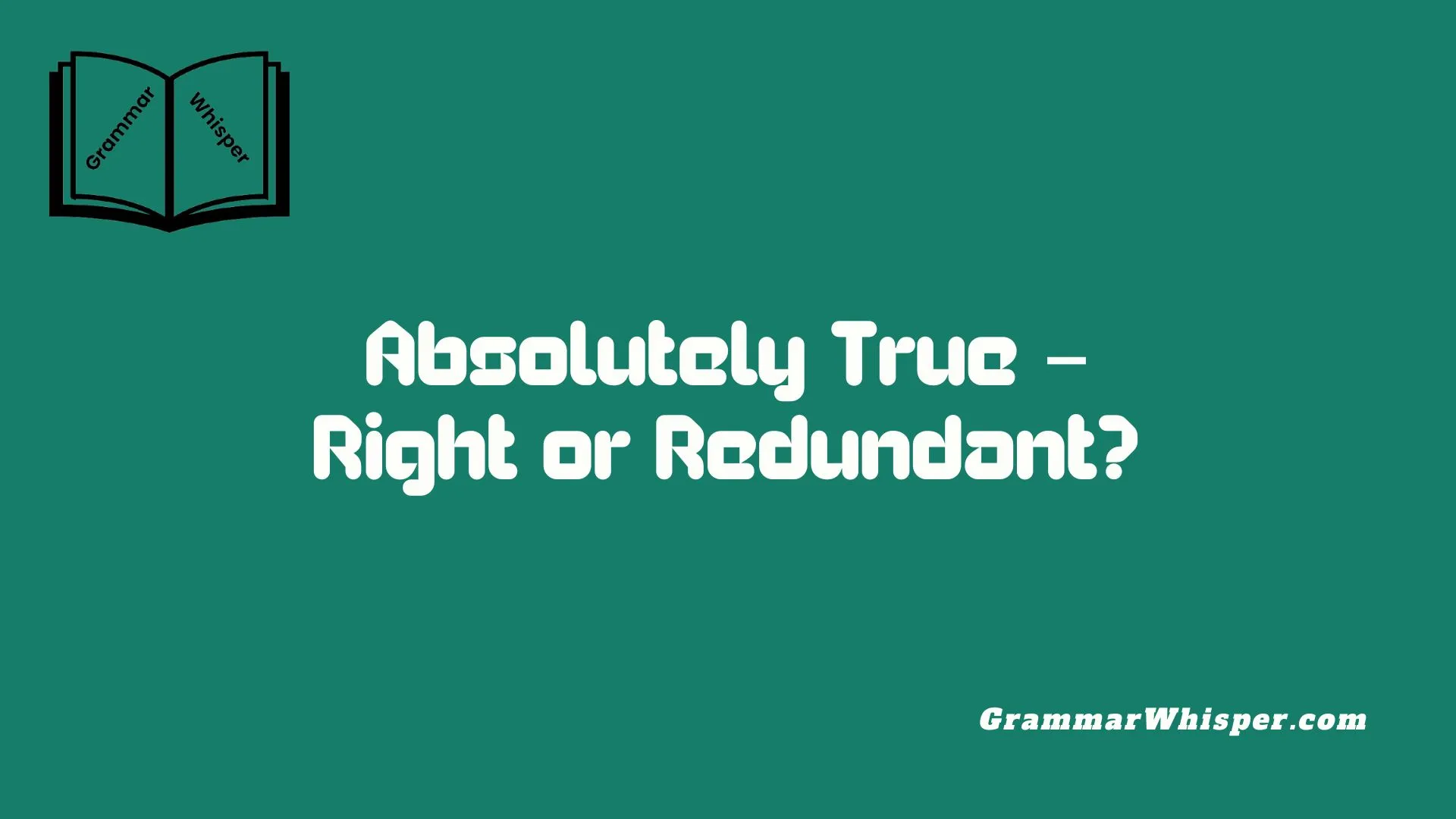When you hear the phrase “Absolutely True” in everyday conversations, it’s a common expression used for affirming a statement, agreeing, or emphasizing a fact. But is it grammatically correct to say it this way? This article aims to explore the role of adverbs like “Absolutely” and their relationship with words like “True” in the English language. Understanding the grammatical structure behind these phrases helps us see their usage in different contexts, from formal to informal settings. For instance, Absolutely True is often compared with Absolutely Right, and knowing the subtle differences offers a deeper understanding of their impact and place in communication.
From my experience, using such phrases thoughtfully improves clarity and tone. This comprehensive look at the usage and meaning of Absolutely True will help you discuss and apply it correctly, whether in writing or speaking. Recognizing the role of “Absolutely” as an adverb and its interaction with “True” shows how small details in language can shape the strength of your message. In short, mastering these phrases enriches your communication skills and makes your language more effective and polished.
Understanding the Role of “Absolutely” in Language
What is an Adverb and How Does It Function?
An adverb is a part of speech that modifies verbs, adjectives, or other adverbs, often providing more detail or emphasizing a particular aspect of a word’s meaning. In the case of “Absolutely,” it is an intensifier, a type of adverb that strengthens or emphasizes the meaning of the word it modifies.
For example:
- “The food is delicious.”
- “She is certain about her decision.”
In these examples, “absolutely” emphasizes the degree to which the adjectives (“delicious” and “certain”) are true. Adverbs like “absolutely” help convey strong emotions or states of certainty, which is why the phrase “Absolutely True” carries so much weight when used in conversation.
The Function of “Absolutely” in Context
The adverb “absolutely” is typically used in informal and formal speech to emphasize the truthfulness or certainty of a statement. When paired with the adjective “true,” it suggests that the truth being described is beyond question.
Consider the following examples:
- “The statement is true.” This indicates a high level of certainty about the truth of the statement.
- “This fact is true.” Here, “absolutely” intensifies the assertion, leaving no room for doubt.
Historical Context: The use of “absolutely” has evolved from a more formal use in philosophical and legal language to a more casual, everyday application. While it once signified something beyond argument, it has now become a frequent tool in casual affirmations.
The Grammar of “Absolutely” and “True”
How “Absolutely” Modifies “True”
In grammatical terms, when we say “Absolutely True,” we are linking an adverb (“absolutely”) with an adjective (“true”). The word “absolutely” functions to enhance or intensify the adjective “true.” This gives the phrase more emphasis compared to simply saying “true.”
Here’s a breakdown of the grammatical structure:
- “True” – An adjective describing the accuracy or factual nature of something.
- “Absolutely” – An adverb intensifying the adjective, suggesting that there is no question about its truth.
Together, the phrase “Absolutely True” is grammatically correct and serves to affirm a statement with certainty.
Clarifying Misunderstandings
Some may feel that adding “absolutely” to “true” is unnecessary or redundant. However, this is not the case. “Absolutely” strengthens the affirmation, turning a basic truth into an undeniable fact. In many situations, this added intensity enhances the credibility of a statement, making it more persuasive.
Here are some examples to help clarify:
- “The Earth is true to its orbit.” This is a factual statement, but there’s no strong emphasis on its certainty.
- “The Earth is true to its orbit.” This stronger version leaves no room for doubt, emphasizing that this truth is unquestionable.
Examples of “Absolutely” in Everyday Language
“Absolutely” isn’t just used with “true.” It’s a versatile word that can be combined with many other adjectives to add emphasis in everyday speech. Some common examples include:
- Amazing
- Perfect
- Stunning
- Certain
- Right
- Impossible
Contextual Variations
The beauty of “absolutely” lies in its ability to elevate language in both formal and informal contexts. In casual conversations, people often use “absolutely” to show strong feelings or opinions.
- Casual Example: “The food is delicious!” In this case, “absolutely” heightens the excitement and approval of the meal.
- Formal Example: “The results of the study are reliable.” Here, “absolutely” gives weight to the statement, making it sound more authoritative.
These examples show how “absolutely” can adapt to the tone and context of conversation, making it an effective tool for enhancing language.
The Nuances of Affirmation: When to Use “Absolutely True”
Understanding Affirmation
The phrase “Absolutely True” carries a sense of finality and certainty. It is often used when we want to stress that something is unquestionably correct or factual.
For example, when someone says, “This is true,” they are asserting with confidence that the information cannot be disputed. This level of certainty is often sought after in debates, discussions, and situations requiring clarity.
Context Matters
It’s important to recognize that the strength of the word “absolutely” may not always be appropriate for every situation. In certain contexts, it could come across as too forceful or overly confident. For example, in delicate or nuanced discussions, using “absolutely true” might seem dismissive of differing viewpoints.
Consider this situation:
- In a scientific debate where facts are being presented and interpreted, saying “This theory is true” could be seen as oversimplifying a complex discussion.
- In a personal conversation where someone shares a belief, saying “That’s true” might come across as validating their perspective without room for personal interpretation.
Comparing Synonyms: “Absolutely Right” vs “Absolutely True”
The words “right” and “true” are often used interchangeably, but they have subtle differences that can affect how “absolutely” modifies them.
- True refers to something that is factually correct, aligning with reality or actual events.
- Right refers to something that is morally or ethically correct, or in alignment with what is considered appropriate.
Here’s how “absolutely” interacts with each:
- Arue: This implies that something is indisputably factual and correct. Example: “The sun rises in the east is true.”
- Right: This emphasizes correctness from a moral or logical standpoint. Example: “You are right about the plan.”
The key difference lies in the type of correctness you’re asserting—factual versus ethical or logical. While both phrases are correct, they serve different purposes depending on the context.
True in Different Scenarios: Formal and Informal Usage
Formal Contexts
In professional, academic, or legal writing, the use of “absolutely true” may sometimes be seen as exaggerated or too emphatic. In these settings, it’s crucial to maintain a tone of neutrality and objectivity.
Example:
- “The findings are true” is sufficient for most professional settings.
- “The findings are true” might feel unnecessarily emphatic unless you’re emphasizing a well-supported conclusion.
Informal Conversations
In casual speech, however, “Absolutely True” is commonly used to strongly affirm something. It’s especially prevalent in personal conversations, online discussions, and social media.
Example:
- Person 1: “I think the new movie is the best one of the year.”
- Person 2: “Absolutely true! It was amazing.”
In informal settings, the phrase emphasizes the agreement and confidence of the speaker. It signals that there is no doubt about the statement being made.
Common Misconceptions About “Absolutely True”
Overusing the Term
Some might argue that “Absolutely True” is used too frequently, making it lose its impact. While it’s useful for emphasizing certainty, overusing it can lead to diminishing its effectiveness. The key is to use it judiciously in situations where you genuinely want to emphasize the truth of something.
Cultural Perceptions
The phrase “Absolutely True” may be perceived differently in various cultural or linguistic contexts. For instance, in cultures where understatement is valued, the use of “absolutely” might be seen as an exaggeration or an overstatement of certainty.
Conclusion
To sum it up, the phrase “Absolutely True” is grammatically correct and serves an important function in language. It’s a powerful tool for intensifying certainty and affirming facts. Whether in formal writing or casual conversations, it’s a phrase that helps clarify truths and make statements more emphatic.
However, just like any other phrase, it’s important to use “absolutely true” in the right context. Overuse it, and it may lose its impact. But when used thoughtfully, “Absolutely True” adds confidence, certainty, and clarity to language.
So, the next time you’re certain about something, don’t hesitate to say it’s “absolutely true.” Just make sure you’re using it in a way that matches the level of emphasis the situation demands.
FAQs:
Is it grammatically correct to say “Absolutely True”?
Yes, it is grammatically correct to say “Absolutely True.” The word “absolutely” is an adverb that intensifies the adjective “true,” making the statement more emphatic. This construction is commonly used to emphasize the certainty or undeniability of a fact or assertion.
What does “Absolutely True” mean?
“True” means that something is undeniably and unquestionably true. It indicates a high degree of certainty, often used to affirm that a statement or fact cannot be disputed. When someone says something is “absolutely true,” they are asserting that there is no doubt about it.
Can I use “Absolutely True” in formal writing?
While “Absolutely True” is grammatically correct, its usage in formal writing depends on the context. In academic, legal, or professional writing, it might be seen as too emphatic or subjective. It’s often better to stick with “true” or “factually correct” in these situations unless you’re emphasizing a well-supported conclusion.
What’s the difference between “Absolutely True” and “Absolutely Right”?
“True” refers to something that is factually correct or in line with reality, while “Absolutely Right” typically refers to something that is morally or logically correct. While both phrases intensify the correctness of a statement, “true” is used more for facts, and “right” is used for ethical or logical correctness.
When is it appropriate to use “Absolutely True”?
“True” is most appropriate when you want to emphasize the certainty of a statement or fact. It’s especially useful in informal conversations or when you want to strongly affirm a truth. However, in formal writing or situations that require neutrality, it may be best to avoid overusing it, as it could sound too forceful or exaggerated.












This paragraph gives clear idea in favor of the new visitors of blogging, that genuinely how to do running a blog.